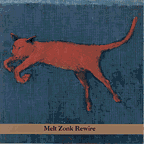Related info:

New Klezmer Trio
Melt Zonk Rewire
tzadik, 1995 (TZ 7103)
61 E. Eighth St., Suite 126, New York, NY 10003
New Klezmer Trio / Melt Zonk Rewire
Ben Goldberg: clarinet, bass clarinetDan Seamans: bass
Kenny Wollesen: drums
- Gas Nine (trad., arr. Wolleson) 2:24
- Sarcophagous (Goldberg) 5:02
- The Haunt (Seamans) 4:33
- Thermoglyphics (Goldberg) 3:33
- The Chant (Goldberg) 3:23
- We Got There (Seamans) 5:27
- Feedback Doina (Wollesen) 5:08
- Freilakh Nakht (trad., arr. Wolleson) 3:04
- Hypothetical (Goldberg) 3:22
- The Shot (Goldberg) 3:59
- Distiller (trad., arr. Seamans) 3:59
- Phrases (Goldberg) 3:29
- Fourth Floor (Seamans) 2:59
- Starting Place (Goldberg) 4:11
This third release from tzadik serves only to underscore the very tenuous connection between Jewish music and free jazz. In this case, beyond the occasional phrase, there is little to identify this as a klez album. This is lively, tight jazz, and I like it, but I won't listen to it when I want to hear klez. That is something else. I also wish that tzadik would spend some time providing context for these albums. A few expository paragraphs on these CDs would at least give some clue as to why these musicians consider these recordings "Jewish"--I mean, I'm sure Benny Goodman considered himself Jewish, and he certainly threw the occasional klez line into his music, but he recognized that he was making straight-up jazz, and expressed all of himself, including the Jewish part, as, simply, "jazz."
Seamans and Goldberg have been playing klezmer for at least the 15 years since I first met them in the Santa Cruz klez revival band, Hotzeplotz. Wolleson was jamming with them at least that far back. Goldberg later joined The Klezmorim, (in its day, the, or one of the sparks that ignited the klez revival) where Wolleson was also, then, drummer. So we're talking about musicians whose klez roots go quite deep. The first NKT album had more of a Jewish feeling, but was less tight and far less integrated musically. Running into Goldberg recently (he was sitting in with a local Bay Area klez group) he told me that the band had broken up. This is the final recorded release. It makes sense. Whatever and wherever this trio are exploring, it is not Jewish music that is providing any significant amount the unity or melodic inspiration demonstrated here.
But maybe the questions this music raises are different. Here I am kvetching about how the musical motifs don't sound particular "Jewish." At least the"kvetch" that belongs in most Jewish music is present! To what degree can the dilemna this album poses musically be applied to the many of us who are far removed from the medieval Judaism of our foreparents, who are, nonetheless, looking for Jewish spirituality and Jewish continuity, and to whom the search for meaningful ways of expressing and transmitting these values is an important part of our lives? Instead of looking at this as a klezmer album that isn't, is it, instead, jazz performed by three Jewish musicians with klezmer souls, come out what may? And if so, what does that mean?
Reviewed by Ari Davidow, 9/29/95
Beyond the realm of groups like The Klezmatics and the Flying Bulgar Klezmer Band are ensembles which aren't trying to play klezmer music at all. One of these is the New Klezmer Trio from Berkeley, California, formed in 1986 by three veterans of the klezmer revival. Ben Goldberg: "I got tired of performing museum music.... So I decided to experiment in playing klezmer without worrying about keeping it 'authentic'." The band has evolved a repertoire that uses the elements of klezmer as the point of departure for a style which draws upon the free jazz aesthetic developed in the late 1960s. Goldberg compares the evolution of the group's music to that of a language: Certain sounds and phrases are familiar from the traditional klezmer syntax, but they are "chewed up, elongated, repeated, bent, and reworked until they're almost unrecognizable."... Joel Rubin, from the liner notes of "Shteygers", 1995

